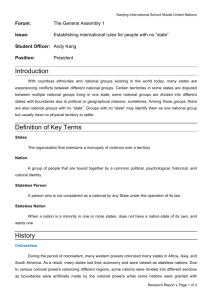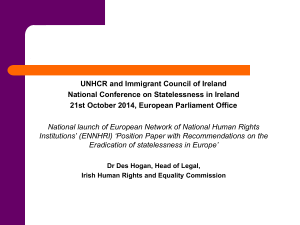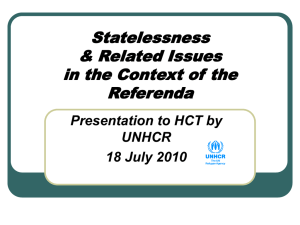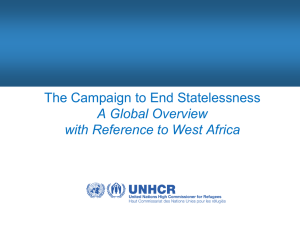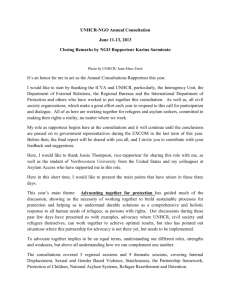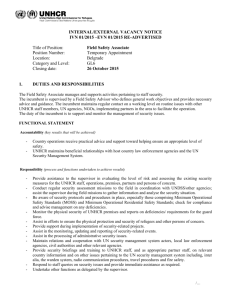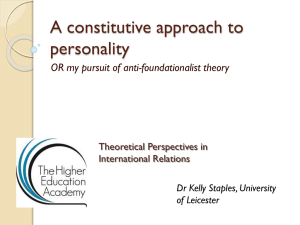T Addressing Statele
advertisement
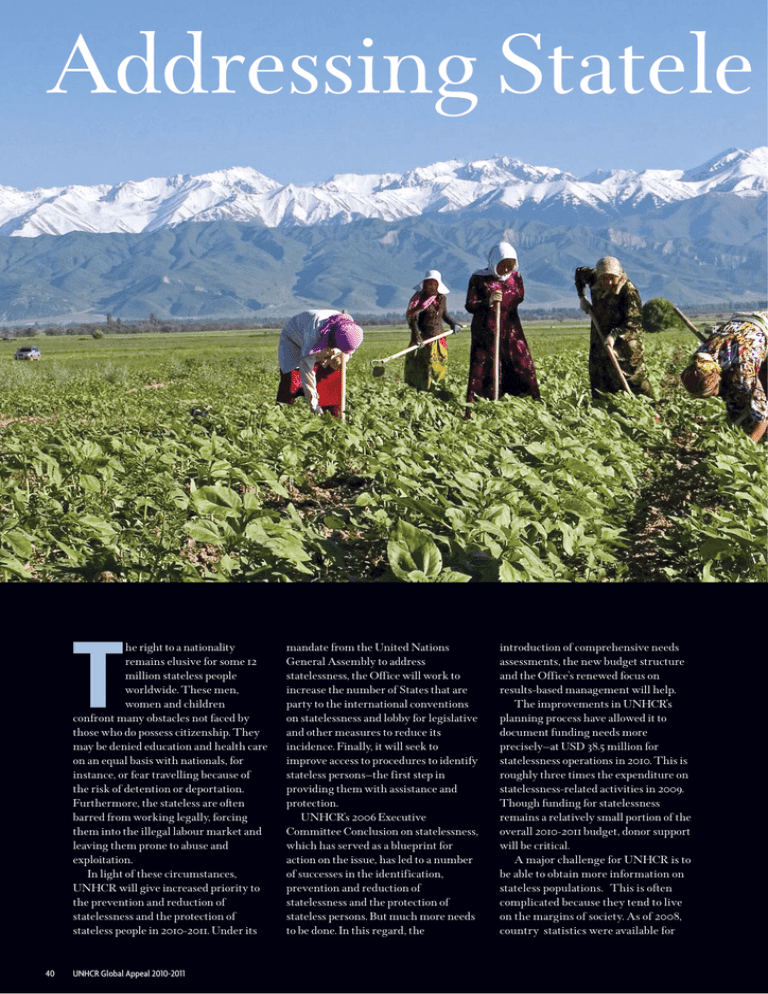
Addressing Statele T he right to a nationality remains elusive for some 12 million stateless people worldwide. These men, women and children confront many obstacles not faced by those who do possess citizenship. They may be denied education and health care on an equal basis with nationals, for instance, or fear travelling because of the risk of detention or deportation. Furthermore, the stateless are often barred from working legally, forcing them into the illegal labour market and leaving them prone to abuse and exploitation. In light of these circumstances, UNHCR will give increased priority to the prevention and reduction of statelessness and the protection of stateless people in 2010-2011. Under its 40 UNHCR Global Appeal 2010-2011 mandate from the United Nations General Assembly to address statelessness, the Office will work to increase the number of States that are party to the international conventions on statelessness and lobby for legislative and other measures to reduce its incidence. Finally, it will seek to improve access to procedures to identify stateless persons—the first step in providing them with assistance and protection. UNHCR’s 2006 Executive Committee Conclusion on statelessness, which has served as a blueprint for action on the issue, has led to a number of successes in the identification, prevention and reduction of statelessness and the protection of stateless persons. But much more needs to be done. In this regard, the introduction of comprehensive needs assessments, the new budget structure and the Office’s renewed focus on results-based management will help. The improvements in UNHCR’s planning process have allowed it to document funding needs more precisely—at USD 38.5 million for statelessness operations in 2010. This is roughly three times the expenditure on statelessness-related activities in 2009. Though funding for statelessness remains a relatively small portion of the overall 2010-2011 budget, donor support will be critical. A major challenge for UNHCR is to be able to obtain more information on stateless populations. This is often complicated because they tend to live on the margins of society. As of 2008, country statistics were available for ssness Formerly stateless women, who recently acquired citizenship in Kyrgyzstan, cultivate crops on land they can now rent or own. U N H C R / A . P LOT N I KOV some 6.6 million stateless people, roughly half the estimated number of people without nationality worldwide. UNHCR will continue to go beyond mere quantitative assessments of the phenomenon of statelessness to better understand its causes and consequences. UNHCR’s 2009 publication, , provides a tool for the organization’s staff, partners and governments to assess statelessness situations. Following the success of a pilot phase in the Balkans, offices worldwide will now use the framework. Additionally, UNHCR will support population censuses and surveys to identify stateless persons more accurately. The results of these efforts will feed into improved needs assessments in the next planning cycle. A key element of a favourable protection environment is a country’s adherence to international legal standards. Unfortunately, the number of countries that have acceded to the two UN Conventions on statelessness remains low. Since 2008, three States have acceded to the 1954 Convention relating to the Status of Stateless Persons and three States have acceded to the 1961 Convention on the Reduction of Statelessness. The total number of States Parties to the 1954 Convention stands at 65, while the total number to the 1961 Convention stands at 37. UNHCR will renew its efforts to promote accession. Armed with new public information tools, it will lobby relevant government authorities, conduct workshops to raise awareness of the Conventions and make submissions before international fora. UNHCR will also use the occasion of the 50th anniversary of the 1961 Convention to emphasize the importance of accession to this treaty. The target set out in the Global Strategic Priorities is to reach 41 States Parties to the 1961 Convention and 68 to the 1954 Convention by the end of 2011. UNHCR will redouble its efforts to design and implement legislative and administrative measures to prevent and reduce statelessness. As gaps in legislation are a major cause of statelessness, UNHCR will promote the application of international standards in nationality laws and related legislation. For instance, one of the key ways to prevent statelessness is to grant UNHCR Global Appeal 2010-2011 41 Addressing Statelessness nationality to children who would otherwise be stateless. UNHCR will seek the inclusion of this safeguard in the legislation of at least eight States in 2010-2011. The Office will also promote a broad range of legal reforms based on States’ treaty obligations, the recommendations of its Executive Committee and recognized best practices. One of the most important tools in preventing statelessness is ensuring that persons at risk of becoming stateless can confirm their nationality and obtain adequate documentation. This often requires large-scale information campaigns and legal assistance projects. In Côte d’Ivoire, for example, UNHCR and its partners have aided thousands of people in the sometimes difficult task of obtaining the identity documentation necessary to confirm nationality. The efforts in Côte d’Ivoire will continue in 2010-2011, as will similar projects in the western Balkans and Iraq. made possible with the decisive action of the governments concerned. In an effort to bolster the political will of governments that face major stateless situations, UNHCR will continue to raise awareness of the negative repercussions of statelessness and ensure that the issue is discussed in international fora. The Office will also promote good practices in resolving statelessness, particularly in protracted situations. In 2010, UNHCR will continue to organize regional strategic meetings with governments in different parts of the world. These meetings will focus on the gaps in law and practice which lead to statelessness, impede solutions and diminish the protection of stateless populations. More importantly, though, the meetings are designed to allow States to exchange information regarding good practices and engage in discussions with UNHCR and other partners on how to best address THE SUCCESSFUL RESOLUTION OF PROTRACTED STATELESSNESS SITUATIONS GENERALLY REQUIRES A MULTIFACETED APPROACH THAT INCLUDES LEGAL REFORM, INFORMATION CAMPAIGNS AND OUTREACH TO STATELESS PEOPLE TO HELP THEM GAIN ACCESS TO THE RELEVANT PROCEDURES UNHCR offices will also seek to reduce statelessness by promoting the acquisition or confirmation of an effective nationality, particularly in protracted situations. The successful resolution of protracted statelessness situations generally requires a multifaceted approach that includes legal reform, information campaigns and outreach to stateless people to help them gain access to the relevant procedures. UNHCR will provide technical advice for such programmes and play an operational role where State or civil society capacity is lacking. Statelessness can often be resolved through existing procedures, particularly naturalization. UNHCR projects in the Russian Federation and Ukraine, for instance, will assist individuals to acquire a nationality by making use of relevant provisions in domestic legislation. Successful large-scale citizenship campaigns in recent years in Nepal and Sri Lanka, and the resolution of the situation of the Bihari/Urdu-speaking population in Bangladesh, were only 42 UNHCR Global Appeal 2010-2011 statelessness. Building upon developments in a range of countries, UNHCR aims to support States in granting or confirming nationality for 500,000 stateless persons in 2010-2011. When an immediate solution for stateless persons may not be possible, it is imperative that a secure status is granted, documentation is issued, and human rights are respected. Establishing is therefore a strategic priority and one of the best means of protecting stateless persons. A number of States have standard procedures to establish whether a person is stateless, and thus grant the person lawful stay if no other solution can be found, but they are few in number. In 2010-2011, UNHCR will focus on the establishment of such procedures to enable States to fulfil their obligations under the 1954 Convention relating to the Status of Stateless Persons, or improve procedures already established under national law. UNHCR will focus on seeking improved access to such procedures in at least six countries. Addressing Statelessness To protect stateless persons from violence and exploitation, UNHCR will advocate against the expulsion and detention of stateless people. In Côte d’Ivoire, for example, it will raise awareness of the problem of violence against stateless people and the need for these populations to move about freely. The Office will promote . A key step will be the organization of participatory assessments among UNHCR offices to address statelessness, particularly where changes in political circumstances require rapid action. Effective responses to statelessness often require inter-agency cooperation. UNHCR will strengthen partnerships with UNICEF, UNDP, UNFPA and OHCHR, among others. It will also strengthen coordination on the issue of statelessness at the global level through the UN Rule of Law Coordination and Resource Group, besides working with ONE OF THE KEY WAYS TO PREVENT STATELESSNESS IS TO GRANT NATIONALITY TO CHILDREN WHO WOULD OTHERWISE BE STATELESS stateless populations, planned for Kenya, Montenegro and the Russian Federation, to identify their concerns and capacities. Stateless people often face significant obstacles in exercising their full range of economic and social rights. UNHCR operations will therefore focus on improving livelihoods and self-reliance, health care and housing, besides advocating for the inclusion of stateless populations in development and poverty reduction programmes. As UNHCR moves to expand its statelessness activities, field offices will require more support from Headquarters and regional offices. Operations will be provided with more detailed positions on issues relating to the definition and prevention of statelessness as well as determination procedures. The upcoming 50th anniversary of the 1961 Convention on the Reduction of Statelessness will provide an opportunity to appraise the impact of the Convention and to decide on future action. UNHCR will continue to conduct a thematic protection learning programme on statelessness at the regional level in order to help staff and partners assess such situations and devise relevant interventions. Additionally, an e-learning course on statelessness will be made available in 2010. In 2009, experts on the issue were identified and deployed under the surge protection project. Further deployments in 2010-2011 will boost the capacity of regional bodies such as the Organization of American States, the African Union and the Council of Europe. UNHCR will continue to work closely with Refugees International and the Open Society Justice Initiative – two strategic allies in the field of statelessness. The Office will also work to expand the number of NGOs involved in research, advocacy and operational responses to statelessness. Greater awareness of the global magnitude and impact of statelessness is essential to generating the political will necessary to tackle the issue. While awareness of statelessness is growing, on the whole it remains low, including among States. UNHCR will continue to shed light on the causes and consequences of statelessness through the web (www.unhcr.org/statelessness), photo exhibitions, videos and other public information material. As part of its long-term efforts to develop civil society and State capacity to address statelessness, the Office will seek to promote academic teaching and research on the subject. It will develop a guide on statelessness for teaching and will encourage universities to develop courses on the subject or include modules on it in courses on human rights and related issues. UNHCR has incorporated the necessary tools to decisively address statelessness in accordance with its mandate. With strong donor support UNHCR will make a difference in the lives of stateless people worldwide. n UNHCR Global Appeal 2010-2011 43
